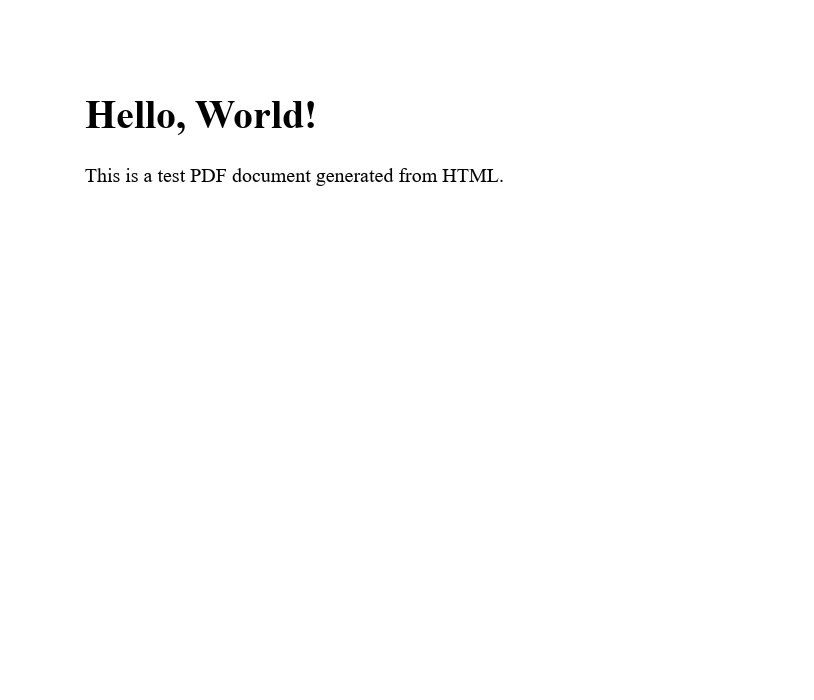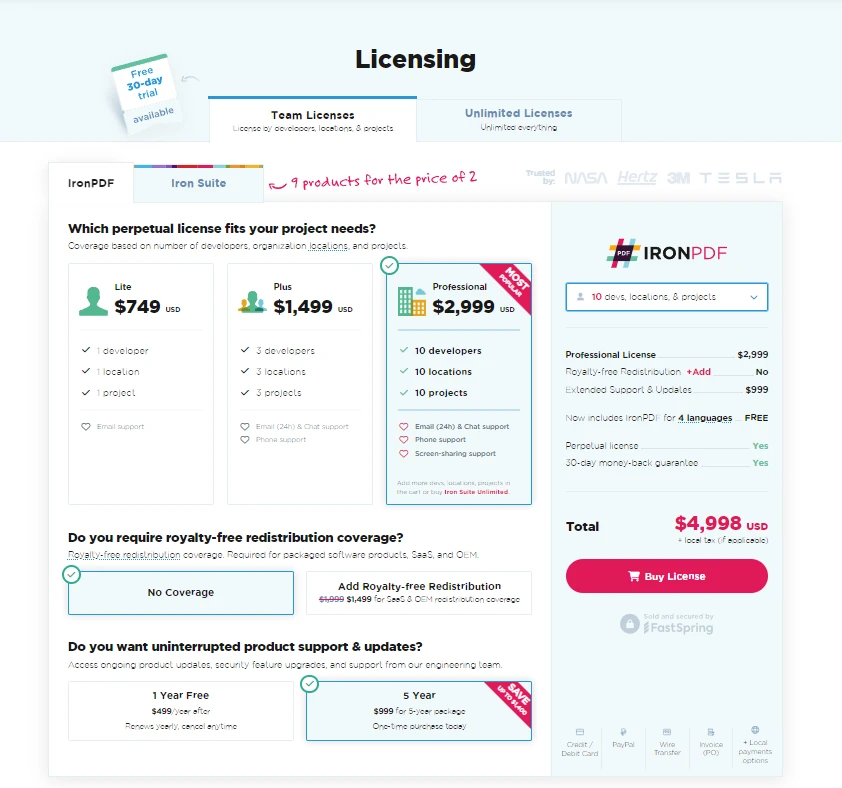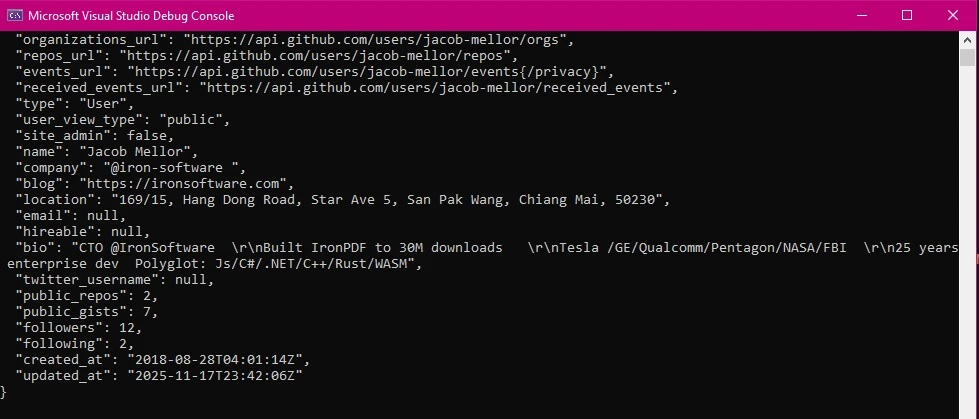C# Generics (How It Works For Developers)
C# generics introduce a way to design classes, methods, interfaces, and delegates where the type of data they manage can be specified as a parameter. This concept, known as a generic type parameter, allows for the creation of flexible and reusable code components. By using generics, you can maximize code reusability, type safety, and performance. For instance, a generic class can be defined once but instantiated with various data types, offering versatility and type integrity. In this article, we'll learn about the basics of C# Generics and IronPDF library features for PDF manipulation.
The Basics of Generic Classes
A generic class in C# is a blueprint for creating a class with a placeholder for the type it contains or operates on. This placeholder, often denoted by T, represents a type parameter that is specified when the class is instantiated. We can create generic classes with type parameter T to handle various data types. Generic classes are particularly useful for collection classes, like lists, queues, and hash tables, as they can hold any data type while ensuring type safety and reducing the need for casting.
Simple Example of a Generic Class
Consider a generic class named Box that is designed to store a value of any type:
public class Box<T>
{
private T data;
public Box(T data)
{
this.data = data;
}
public T Data
{
get { return data; }
}
}public class Box<T>
{
private T data;
public Box(T data)
{
this.data = data;
}
public T Data
{
get { return data; }
}
}To use this class, you create an instance specifying the actual type for T:
Box<int> integerBox = new Box<int>(123);
Box<string> stringBox = new Box<string>("Hello");Box<int> integerBox = new Box<int>(123);
Box<string> stringBox = new Box<string>("Hello");This code illustrates how a single class (Box
Implementing Generic Methods
Generic methods are similar to generic classes but are defined with type parameters at the method level. This allows for creating methods that can operate on different types while being defined in a non-generic class or a generic one.
Example of a Generic Method
Here's a method that swaps two elements in an array of any type:
public class Utility
{
// Swaps two elements by reference using generics
public static void Swap<T>(ref T lhs, ref T rhs)
{
T temp = lhs; // Store lhs in a temporary variable
lhs = rhs; // Assign rhs to lhs
rhs = temp; // Assign temp (original lhs) to rhs
}
}public class Utility
{
// Swaps two elements by reference using generics
public static void Swap<T>(ref T lhs, ref T rhs)
{
T temp = lhs; // Store lhs in a temporary variable
lhs = rhs; // Assign rhs to lhs
rhs = temp; // Assign temp (original lhs) to rhs
}
}Usage of the above method can be as follows:
int a = 1, b = 2;
Utility.Swap<int>(ref a, ref b);
string first = "world", second = "hello";
Utility.Swap(ref first, ref second);int a = 1, b = 2;
Utility.Swap<int>(ref a, ref b);
string first = "world", second = "hello";
Utility.Swap(ref first, ref second);Exploring Generic Interfaces and Delegates
Generic interfaces and delegates enable defining contracts and callback methods that can operate with any type. Implementing a generic interface or using a generic delegate in your class or method enhances flexibility and code reuse.
Generic Interface Example
A generic repository interface for data access operations might look like this:
public interface IRepository<T>
{
void Add(T item);
T GetById(int id);
IEnumerable<T> GetAll();
}public interface IRepository<T>
{
void Add(T item);
T GetById(int id);
IEnumerable<T> GetAll();
}This interface can be implemented by any class to handle specific data types, allowing for consistent data access patterns across different types.
Generic Delegate Example
A generic delegate could be used to define a type-safe callback:
public delegate void Action<T>(T item);public delegate void Action<T>(T item);Utilizing Generic Collections
Generic collection classes, such as List
List<string> names = new List<string>();
names.Add("Alice");
names.Add("Bob");
Dictionary<int, string> keyValuePairs = new Dictionary<int, string>();
keyValuePairs.Add(1, "One");
keyValuePairs.Add(2, "Two");List<string> names = new List<string>();
names.Add("Alice");
names.Add("Bob");
Dictionary<int, string> keyValuePairs = new Dictionary<int, string>();
keyValuePairs.Add(1, "One");
keyValuePairs.Add(2, "Two");Creating Custom Generic Types
Beyond using built-in generic types, you can create your own to encapsulate operations that are common across different data types but need to be handled in a type-specific manner. This approach is particularly useful for building libraries, frameworks, or utilities that are to be used with various data types.
Custom Generic Type Example
Consider a generic Result class that encapsulates operation results along with a success flag and an optional message:
public class Result<T>
{
public bool Success { get; private set; }
public T Data { get; private set; }
public string Message { get; private set; }
public Result(bool success, T data, string message = "")
{
Success = success;
Data = data;
Message = message;
}
}public class Result<T>
{
public bool Success { get; private set; }
public T Data { get; private set; }
public string Message { get; private set; }
public Result(bool success, T data, string message = "")
{
Success = success;
Data = data;
Message = message;
}
}IronPDF: C# PDF Library
IronPDF is a comprehensive library designed for .NET developers to create, edit, and extract PDF documents within their applications. IronPDF helps in generating PDFs from HTML, editing existing PDFs, converting PDFs to images, and many more. While IronPDF itself is not based on generics, understanding how to interact with this library in a C# environment can greatly enhance your application's document management capabilities.
Code Example: Using virtual Keyword with IronPDF
The idea behind using generics here is to create a reusable method that can generate a PDF from any given HTML string. This method will be generic, allowing us to specify different types of metadata or configurations as needed.
First, let's define a simple generic class that will hold our PDF generation options. For demonstration purposes, this class will be basic, but you can expand it with more properties to suit your needs.
public class PdfOptions<T>
{
public T Metadata { get; set; }
public string HtmlContent { get; set; }
}public class PdfOptions<T>
{
public T Metadata { get; set; }
public string HtmlContent { get; set; }
}Now, let's create a static method that generates a PDF using IronPDF, leveraging our PdfOptions
using IronPdf; // Make sure to include the necessary namespace for IronPDF
public static class PdfGenerator
{
// Generates a PDF from provided HTML content and options
public static void GeneratePdf<T>(PdfOptions<T> options)
{
// Initialize the IronPDF HtmlToPdf renderer
var renderer = new ChromePdfRenderer();
// Optional: Apply any renderer options here, for example, setting the paper size
renderer.RenderingOptions.PaperSize = IronPdf.Rendering.PdfPaperSize.A4;
// Generate the PDF from HTML content
var pdfDocument = renderer.RenderHtmlAsPdf(options.HtmlContent);
// Optional: Here, you can use options.Metadata in some way, depending on your generic type T
// For simplicity, we're just printing the metadata to console if it's of type string
if (options.Metadata is string metadataString)
{
Console.WriteLine($"Metadata: {metadataString}");
}
// Save the PDF to a file
var fileName = $"GeneratedPdf_{DateTime.Now.Ticks}.pdf";
pdfDocument.SaveAs(fileName);
Console.WriteLine($"PDF generated and saved as {fileName}");
}
}using IronPdf; // Make sure to include the necessary namespace for IronPDF
public static class PdfGenerator
{
// Generates a PDF from provided HTML content and options
public static void GeneratePdf<T>(PdfOptions<T> options)
{
// Initialize the IronPDF HtmlToPdf renderer
var renderer = new ChromePdfRenderer();
// Optional: Apply any renderer options here, for example, setting the paper size
renderer.RenderingOptions.PaperSize = IronPdf.Rendering.PdfPaperSize.A4;
// Generate the PDF from HTML content
var pdfDocument = renderer.RenderHtmlAsPdf(options.HtmlContent);
// Optional: Here, you can use options.Metadata in some way, depending on your generic type T
// For simplicity, we're just printing the metadata to console if it's of type string
if (options.Metadata is string metadataString)
{
Console.WriteLine($"Metadata: {metadataString}");
}
// Save the PDF to a file
var fileName = $"GeneratedPdf_{DateTime.Now.Ticks}.pdf";
pdfDocument.SaveAs(fileName);
Console.WriteLine($"PDF generated and saved as {fileName}");
}
}Finally, let's use our PdfGenerator class to generate a PDF document. In this example, the Metadata property could be a string containing a title or any other information you find relevant.
class Program
{
static void Main(string[] args)
{
// Set the license key for IronPDF if needed
License.LicenseKey = "Your-License-Key-Here";
// Create PDF options with HTML content and metadata
var options = new PdfOptions<string>
{
HtmlContent = "<h1>Hello, World!</h1><p>This is a test PDF document generated from HTML.</p>",
Metadata = "Test PDF Title"
};
// Generate the PDF using the specified options
PdfGenerator.GeneratePdf(options);
}
}class Program
{
static void Main(string[] args)
{
// Set the license key for IronPDF if needed
License.LicenseKey = "Your-License-Key-Here";
// Create PDF options with HTML content and metadata
var options = new PdfOptions<string>
{
HtmlContent = "<h1>Hello, World!</h1><p>This is a test PDF document generated from HTML.</p>",
Metadata = "Test PDF Title"
};
// Generate the PDF using the specified options
PdfGenerator.GeneratePdf(options);
}
}This example illustrates the basics of integrating IronPDF with C# Generics, providing a flexible way to generate PDFs from HTML content while allowing for customizable metadata or configurations through the generic PdfOptions

Conclusion

C# generics is a powerful tool for developing high-quality, reusable, and type-safe code. By understanding and applying generic classes, methods, interfaces, and delegates, you can write code that is more adaptable and easier to maintain. Generics not only enable code reuse across different data types but also ensure compile-time type checking, which reduces runtime errors and improves overall code quality. IronPDF offers a free trial of its PDF library tools, with costs from $799 onwards.
Frequently Asked Questions
What are generics in C#?
C# generics introduce a way to design classes, methods, interfaces, and delegates with a type parameter. This allows the creation of flexible and reusable code components that provide type safety and performance improvements.
How do generic classes work in C#?
A generic class in C# uses a type parameter, often denoted as T, which acts as a placeholder for the type it contains or operates on. This allows the class to be instantiated with various data types while maintaining type safety.
Can you give an example of a generic class in C#?
Yes, a simple example is a Box class that stores a value of any type. You can create instances like Box or Box to store different data types using the same class.
What is a generic method in C#?
A generic method is defined with type parameters at the method level, allowing it to operate on different types. It can be part of a non-generic or a generic class, providing flexibility in method design.
How can generic interfaces and delegates be used in C#?
Generic interfaces and delegates allow the definition of contracts and callback methods that can operate with any type, enhancing flexibility and code reuse.
What are the benefits of using generic collections in C#?
Generic collections like List and Dictionary offer type-safe and efficient storage for any specific type, eliminating the need for casting and reducing runtime errors.
How can I create custom generic types in C#?
You can create custom generic types to encapsulate operations common across different data types but handled in a type-specific manner, useful for building libraries or utilities.
How can C# generics improve PDF generation in .NET?
C# generics can be utilized with a PDF library to create flexible and reusable components. For example, a PdfOptions class can be used to hold PDF generation options, demonstrating the adaptability of generics with PDF tasks.
How can a PDF library be utilized with C# generics?
A PDF library, such as IronPDF, can use C# generics to enhance its functionality. For instance, a generic method could be used to convert HTML to PDF, providing a flexible approach to document generation.
What are the advantages of using C# generics?
C# generics allow for code reuse across different data types, ensure compile-time type checking, reduce runtime errors, and improve overall code quality. They enable writing adaptable and maintainable code.





















